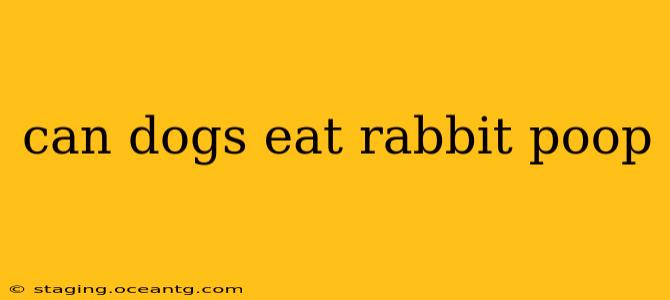Can Dogs Eat Rabbit Poop? A Comprehensive Guide to Coprophagia in Canines
The question, "Can dogs eat rabbit poop?" is surprisingly common among dog owners. While the answer might seem simple, it's crucial to understand the potential risks and consequences of coprophagia (the eating of feces) in dogs. The short answer is: No, dogs should not eat rabbit poop. This seemingly innocuous behavior can lead to serious health problems for your canine companion.
Let's delve deeper into the reasons why you should prevent your dog from consuming rabbit droppings and explore related concerns.
Why is it harmful for dogs to eat rabbit poop?
Rabbit feces, while seemingly harmless, can harbor various parasites and bacteria that can infect your dog. These include:
- Coccidia: These microscopic parasites can cause diarrhea, vomiting, and dehydration in dogs.
- E. coli: This bacterium can lead to severe gastrointestinal upset, including bloody diarrhea.
- Salmonella: Another potentially dangerous bacterium that can cause serious illness in dogs.
- Toxoplasmosis: Though less common, this parasite can be particularly harmful to pregnant dogs and their unborn puppies.
Even if the rabbit appears healthy, its droppings might contain pathogens. The risk is amplified if the rabbit's diet includes contaminated food or water.
What if my dog already ate rabbit poop?
If you suspect your dog has ingested rabbit feces, monitor them closely for any signs of illness. These can include:
- Diarrhea: Loose, watery, or bloody stools.
- Vomiting: Repeated episodes of throwing up.
- Lethargy: Unusual tiredness or lack of energy.
- Loss of appetite: Refusal to eat or drink.
- Dehydration: Dry gums, sunken eyes, and decreased skin elasticity.
If you notice any of these symptoms, contact your veterinarian immediately. Early intervention can significantly improve your dog's chances of a full recovery. Your vet might recommend supportive care, such as fluid therapy, or medication to address specific infections.
Why do dogs eat poop in the first place? (Coprophagia)
The reasons behind coprophagia are multifaceted and not always easy to pinpoint. Some potential causes include:
- Nutritional deficiencies: A lack of essential nutrients in their diet might drive dogs to seek them out in feces.
- Pancreatic insufficiency: A condition where the pancreas doesn't produce enough enzymes to digest food properly.
- Stress or anxiety: Some dogs engage in coprophagia as a coping mechanism.
- Medical conditions: Underlying health issues can sometimes contribute to this behavior.
- Learned behavior: If a dog has had a positive experience eating feces (perhaps it tasted interesting once), they may repeat the behavior.
How can I prevent my dog from eating rabbit poop?
Preventing your dog from eating rabbit poop requires a multi-pronged approach:
- Supervise your dog: Keep a close eye on your dog, especially when they're outdoors.
- Clean up promptly: Remove rabbit droppings from your yard or any areas your dog has access to as quickly as possible.
- Address underlying medical issues: Consult your veterinarian if you suspect a medical condition might be contributing to the behavior.
- Enrich their environment: Provide plenty of toys, exercise, and mental stimulation to reduce boredom and stress.
- Dietary adjustments: Ensure your dog's diet is balanced and nutritionally complete. Consult your vet or a veterinary nutritionist for guidance.
In conclusion, preventing your dog from eating rabbit poop is crucial for their health and well-being. By understanding the risks and implementing preventative measures, you can protect your furry friend from potential illness. If you have any concerns about your dog's behavior or health, always consult with your veterinarian. They are the best resource for providing personalized advice and care for your pet.
